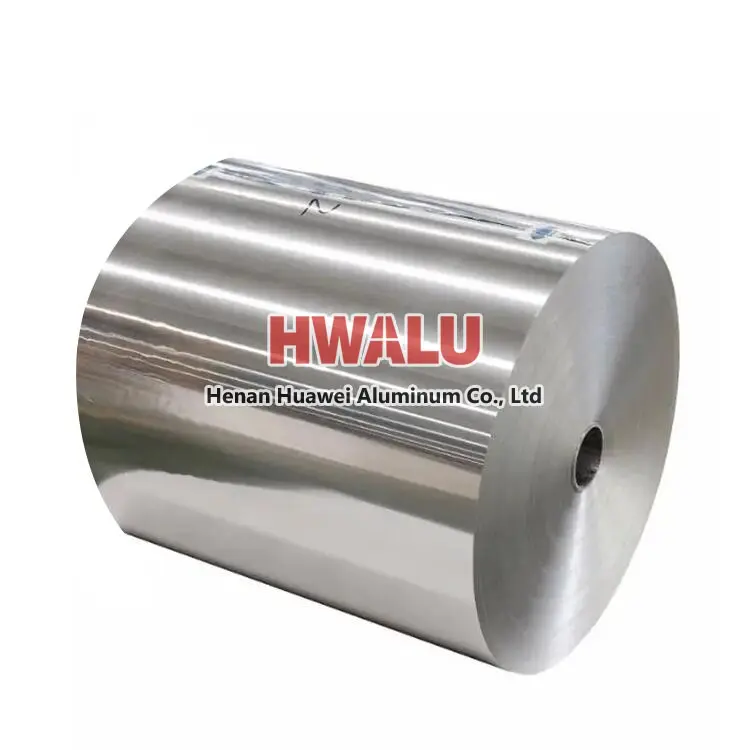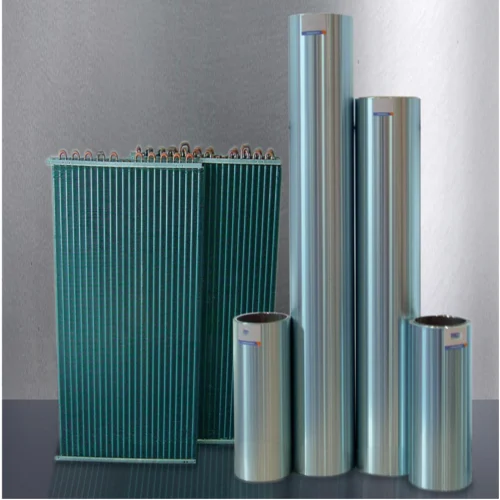Alloy parameters of aluminum foil for cups Aluminium foil for cups is usually made of aluminium alloy materials with good processability and corrosion resistance, mainly including 8000 series and 3000 series. --3003 aluminum alloy Alloy composition Al 96.8% - 99.5%, Mn 1.0% - 1.5% Physical properties density 2.73g/cm³, thermal expansion coefficient 23.1×10^-6/K, thermal conductivity 125 W/(m K), e ...
What is aluminum foil for stickers Aluminum foil is a flexible, lightweight material perfect for making stickers. You can use aluminum foil for decorations, labels, stickers, and more, just cut out and add adhesive. Of course, stickers made of aluminum foil may not be as durable as stickers made of other materials, because aluminum foil is prone to chipping and tearing. Also, you need to be careful when using ...
What is AC aluminum foil? Air conditioning aluminum foil, often called AC foil or HVAC foil, is a type of aluminum foil used in the heating, ventilation and air conditioning (HVAC) industry. Air-conditioning aluminum foil is usually used to make heat-conducting fins for air-conditioning heat exchange and air-conditioning evaporators. It is one of the important alloys used in air conditioning manufacturing raw ma ...
Alloy parameters of aluminum foil for chocolate packaging Chocolate packaging aluminum foil is usually composed of aluminum and other alloying elements to increase its strength and corrosion resistance. Alloy series 1000, 3000, 8000 series aluminum alloy Alloy state H18 or H19 hardened state Alloy composition pure aluminum containing more than 99% aluminum, and other elements such as silicon, ...
What is a lidding foil? Lidding foil, also known as lid foil or lid, is a thin sheet of aluminum or composite material used to seal containers such as cups, jars, and trays to protect the contents inside. Lidding foils come in a variety of shapes, sizes, and designs to suit different types of containers and packaging applications. They can be printed with branding, logos, and product information to enhance a ...
Alloy parameters of aluminum foil for cups Aluminium foil for cups is usually made of aluminium alloy materials with good processability and corrosion resistance, mainly including 8000 series and 3000 series. --3003 aluminum alloy Alloy composition Al 96.8% - 99.5%, Mn 1.0% - 1.5% Physical properties density 2.73g/cm³, thermal expansion coefficient 23.1×10^-6/K, thermal conductivity 125 W/(m K), e ...
A watch, two, feel, three, folding, four, twist, 5, knife scraping, 6, fire method, to help you identify the plastic composite packaging is made of aluminum foil or aluminum film material. Two, watch: the brightness of the packaging aluminum layer is not as bright as the aluminum plated film, that is, the packaging made of aluminum foil is not as bright as the packaging made of the aluminum plated film. Alumin ...
It is generally believed that the single-sheet rolling speed of the aluminum foil should reach 80% of the rolling design speed of the rolling mill. Danyang Aluminum Company introduced a 1500 mm four-high irreversible aluminum foil roughing mill from Germany ACIIENACH. The design speed is 2 000 m/min. At present, the single-sheet aluminum foil rolling speed is basically at the level of 600m/miT, and the domestic s ...
The development of new energy vehicles is an important part of the low-carbon economy, and plays an important role in alleviating the contradiction between energy supply and demand, improving the environment, and promoting sustainable economic development. New energy vehicles are one of the industries that best reflect a country's technological development level, independent innovation capabilities and internatio ...
1-Moisture-proof and anti-oxidation: Aluminum foil paper can effectively prevent food from getting wet and oxidized and cause deterioration, so as to maintain the freshness and taste of food. 2-Thermal insulation: The thermal conductivity of aluminum foil paper is very low, which can effectively insulate heat and prevent heat loss. 3-Blocking UV rays: Aluminum foil can effectively block UV rays and protect ...
Aluminum foil rolling produces plastic deformation under the conditions of roll-free rolling. At this time, the rolling mill frame is elastically deformed and the rolls are elastically flattened. When the thickness of the rolled piece reaches a smaller and more limited thickness h. When the rolling pressure has no effect, it is very difficult to make the rolled piece thinner. Usually two pieces of aluminum foi ...
Aluminum foil lunch box is a new type of non-toxic and environmentally friendly tableware. 1. The main ingredient in the aluminum foil lunch box is aluminum, so it will react with acid like aluminum cans, and the salt produced by aluminum and organic acids will react with gastric acid to produce aluminum chloride, so we need to use it. Note that, generally speaking, it is often used for steaming rice. There is ...







